To commemorate the tenth anniversary of the University of Michigan- Shanghai Jiao Tong University Joint Institute (UM-SJTU JI), an International Symposium on Global Education was held at SJTU on April 10, attended by nearly 100 academic leaders and professionals from international communities with various experiences and cross-disciplinary expertise. The scholars reflected upon global education issues and discussed multiple strategies for fostering the next generation of innovative global leaders. The speakers shared their visions, strategies, difficulties, obstacles and contributions concerning global education. Officiant Dr. Chien-pin Chen, JI Associate Dean for Graduate Education, opened the symposium and welcomed the participants.
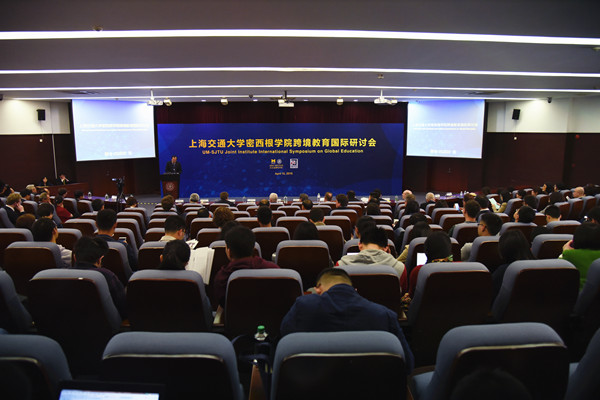
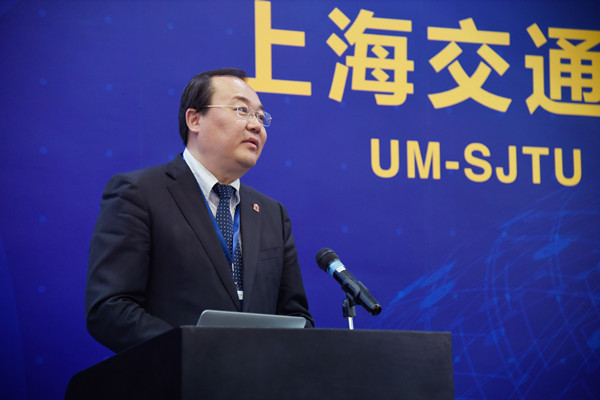
In his opening remarks, Mr. Wa Zong, Deputy Secretary-General of China International Education Exchange Association, expressed warm congratulations on JI’s tenth anniversary. As a SJTU alumnus, he resonated deeply with his alma mater‘s vision on international educational cooperation. He hoped JI’s successful experience could provide inspiration and guidance for higher education at home and abroad in training global leaders.
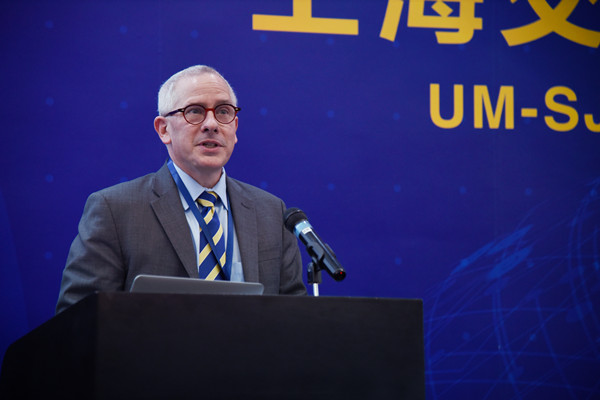
Dr. James Holloway, Vice Provost for Global and Engaged Education at University of Michigan, gave a key-note speech titled “The Art of Partnership.” He argued that as global engagement of research universities has become a necessity, universities should build bridges with other institutions– not only with other universities, but also with governmental organizations, with NGOs and with companies. For a successful partnership, the bridges should be tailored to the local geography and the needs of the local community. By a detailed comparison between the UM-SJTU partnership and the UM-Ethiopia partnership, Holloway illuminated the art of partnership.
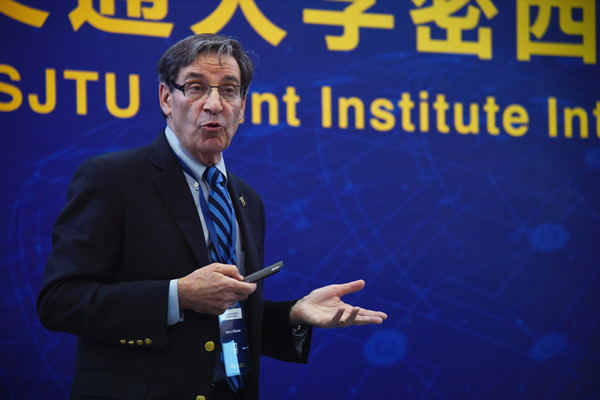
Dr. Larry Shuman, GE³ chairman, Senior Associate Dean for Academic Affairs and Distinguished Service Professor of Industrial Engineering at University of Pittsburgh, delivered another key-note speech titled “The Effectiveness of Various Forms of International Experiences on Students Achieving a Global Perspective.” He pointed out that as 21st century engineers are increasingly being called upon to solve complex problems in cross-cultural contexts, studying abroad has become a bandwagon for college students and administration to join. However, it is expensive and so far there has been no empirical research to prove if there is really a correlation between various study-abroad experiences and students’ global preparedness. He reported on an ongoing extensive empirical study involving 4 universities to understand how the various international experiences, both inside (curricular) and outside (co-curricular) of formal coursework, impact students’ global preparedness. This is timely and hopefully the results will shed light on the trend of studying abroad.
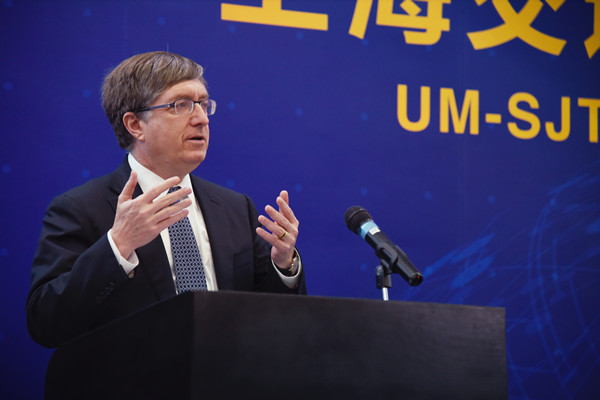
In his talk “Twenty-First Century Leadership Skills: The Importance of Multicultural Effectiveness and Disciplined Creativity,” Dr. Jeff Lehman, Vice Chancellor of NYU Shanghai, remarked that information technology has reconfigured the world into which today’s students will graduate, therefore it is vital that today’s universities prepare them with the qualities of multicultural effectiveness and disciplined creativity that the times require.
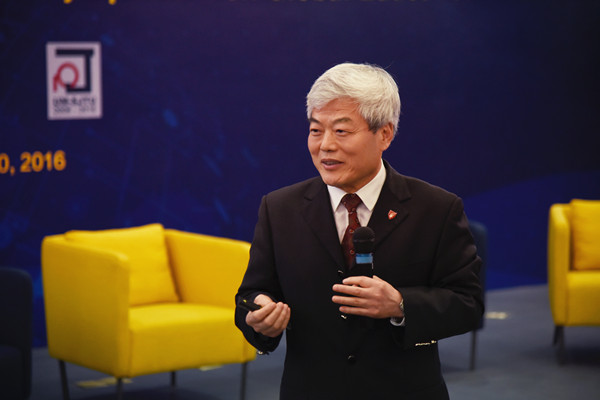
Dr. Youmin Xi, Executive President of Xi’an Jiaotong-Liverpool University, gave a seminar on how T3 (trans-national, trans-cultural and trans-disciplinary) education nurtures cross-cultural future leaders. Xi observed that the demand for future global talents is pushing the higher education sector to rethink education and redefine university. Xi analyzed the T3 education as a strategy to meet the demand. He reported that the development of Xi’an Jiaotong-Liverpool University (XJTLU), an international cooperative university, has been taken as a case study to reflect on the experiences and lessons of such kind of educational exploration.
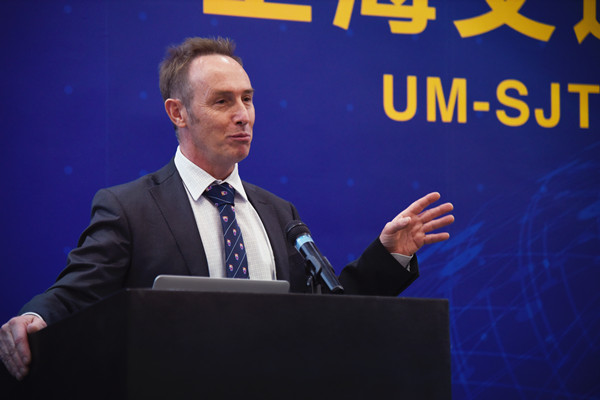
Dr. Chris Rudd, Provost of University of Nottingham Ningbo China, presented “Smile to succeed! Building Social Capital on Borrowed Land.” As Nottingham Ningbo is in its 12th year of operation and completes the first cycle, Dr. Rudd laid out the university’s successes and future challenges to ambitious development. He thinks it is time to reflect on the social and economic outcomes from their operation– benefits for their students, benefits for China and their home city of Nottingham.
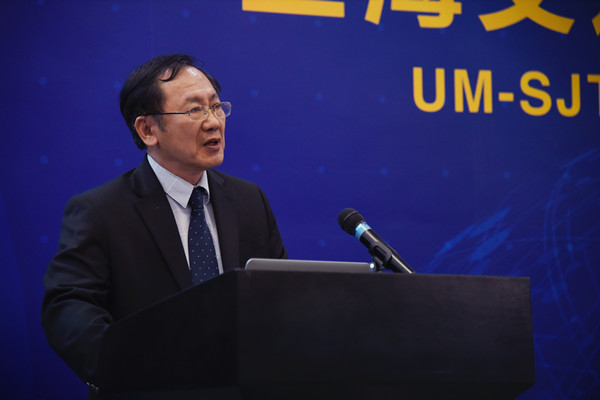
In his talk of “Borrowing the JI idea: the Sichuan University– Pittsburgh Institute (SCUPI); Now and Moving Forward,” Dr. Minking Chyu, Dean of Sichuan-Pitt Joint Institute, introduced the first US-China joint institute in western China, following the JI model of international education collaboration. SCUPI’s curricula are equivalent to those of the Swanson School of Engineering at Pittsburgh University and SCUPI works closely with the Engineering Educational Research Center (EERC) at the University of Pittsburgh. He presented SCUPI‘s mission as cultivating students to become outstanding global citizens, innovators and future leaders.
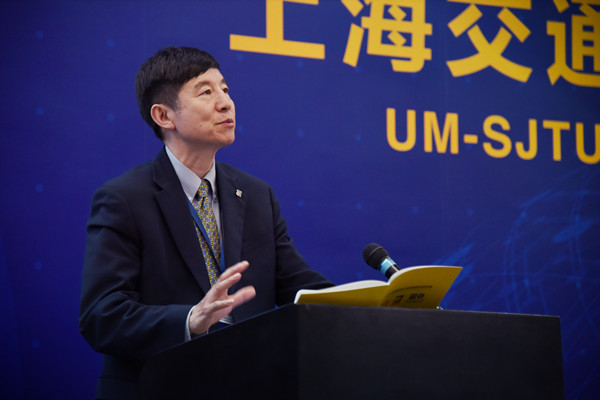
Dr. Jun Ni, founder and Honorary Dean of JI, reflected on “JI Experience.” Ni looked back at the period from 2006 to 2014, where he had introduced the education system, management structure, research collaboration and training model from American universities and had been committed to exploring innovative approaches to higher education reform. He had persistently pursued his goal of cultivating global innovative leaders on China’s soil by combining the best features of Sino-US educational philosophy and systems. Even after serving his eight-year tenure at JI, Ni continues to make efforts for JI’s development through various ways. He is proud of JI’s achievements but is also vigilant about the competitions and challenges JI is facing in the future development.
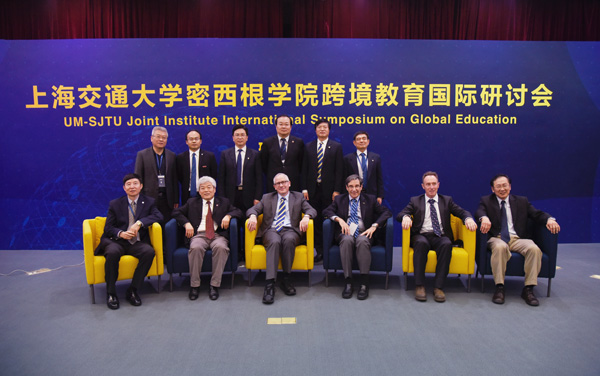 The speakers of the symposium
The speakers of the symposium
The panel discussion session following the seminar was animated with exchanges among the distinguished scholars and audience. JI’s innovative educational model was the hottest topic of the day. Quite a few participants from the audience commented that the symposium represented the highest level of exchanges on cross-border education based on the seminar speakers’ backgrounds and enlightening speeches.
The symposium is one of the commemorative events on JI’s tenth anniversary. As a pioneer in international education, JI’s efforts in bringing professionals and experts under one roof to discuss important issues and share valuable experience on global education are highly meaningful. The symposium may be helpful as a spring board for leaping advancement in global education and global leaders training.





